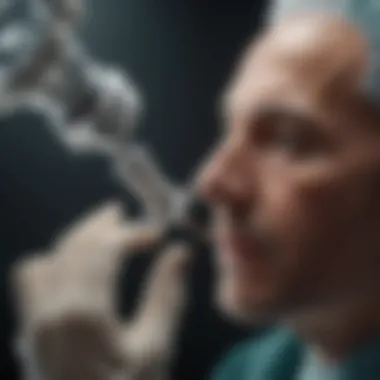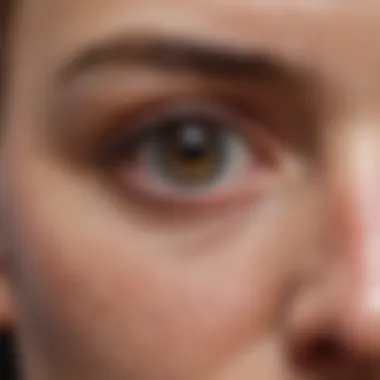Dr. Mayer's Impact on Modern Ophthalmology


Intro
Dr. Mayer's work in ophthalmology has profoundly shaped the contemporary landscape of eye care. His clinical practices and surgical advancements have not only improved patient outcomes but also set higher standards in the field. This article aims to dissect his philosophies, exploring how his methodologies contribute to both research and practical applications within ophthalmology. The insights gathered here will serve as a valuable resource for students, researchers, and professionals looking to understand the nuances of Dr. Mayer's impact.
Research Highlights
Key Findings
Dr. Mayer has contributed to several key areas in ophthalmology:
- Surgical Innovation: He pioneered new surgical techniques that have minimized recovery times for patients and enhanced surgical success rates.
- Comprehensive Patient Care: His approach emphasizes holistic patient management, which prioritizes not just surgical outcomes but also overall patient wellbeing.
- Cutting-edge Research: Mayer's research in ocular diseases has led to advancements in treatment protocols, significantly impacting the standard of care.
Implications and Applications
The implications of Dr. Mayer's work extend beyond immediate patient care:
- Enhanced surgical techniques are now widely adopted and incorporated into training programs, influencing a new generation of ophthalmologists.
- His research findings serve as a foundation for ongoing studies, further pushing the boundaries of what is known in the field.
- By advocating for patient-centered care, he helped shift the focus within the ophthalmology community toward better overall patient experiences.
"Dr. Mayer's techniques redefine what is achievable in ophthalmology, making a lasting impact on both patients and medical professionals."
Methodology Overview
Research Design
Dr. Mayer approaches his research with a systematic and rigorous methodology. He typically employs longitudinal studies to gather data on surgical outcomes over time. This allows for a comprehensive view of not just immediate results but long-term patient benefits and potential complications.
Experimental Procedures
In his studies, he often utilizes:
- Controlled clinical trials to ensure valid results.
- Patient surveys that focus on quality of life post-surgery, providing insight into the holistic benefits of treatment.
- Advanced imaging technology to monitor surgical effects, ensuring precision in interventions.
Each of these components serves to enhance the reliability of his findings and their subsequent applications in clinical practice.
Overview of Dr. Mayer’s Career in Ophthalmology
Dr. Mayer's contributions to the field of ophthalmology reflect a blend of expertise, dedication, and innovation. Understanding his career journey is crucial for appreciating his impact on modern eye care practices. This overview will highlight key moments, pivotal achievements, and the direction of his work within the field.
Educational Background and Training
Dr. Mayer's educational foundation is a cornerstone of his success. He graduated from a reputable medical school. After obtaining his medical degree, he pursued specialized training in ophthalmology. This involved rigorous residency programs that equipped him with advanced surgical skills and comprehensive knowledge of ocular diseases. Additionally, Dr. Mayer attended various workshops and conferences, staying abreast of emerging trends in the medical field.
The importance of his educational background cannot be overstated. It has informed his methods, approaches to patient care, and understanding of complex ocular issues. Completing post-graduate studies contributed further to his competence and opened doors to collaborations with industry leaders.
Professional Affiliations and Certifications
Dr. Mayer maintains active involvement with several professional organizations. These affiliations provide him with a platform for engagement and professional growth. Being a member of groups like the American Academy of Ophthalmology and the American Society of Cataract and Refractive Surgery has allowed him to contribute to clinical guidelines and best practices in the field.
Dr. Mayer holds multiple certifications that attest to his expertise. These certifications are indicative of his commitment to adhering to the highest standards in patient care. They serve as a reassurance to patients regarding his capabilities and dedication. Furthermore, ongoing certification renewal reflects his commitment to lifelong learning and practice improvement.
Clinical Specialties of Dr. Mayer
Dr. Mayer has established a reputation as a leading figure in ophthalmology through his extensive clinical knowledge and specialized practices. His clinical specialties are not solely about performing advanced surgical procedures, but they also emphasize the importance of accurate diagnosis and comprehensive management of various eye conditions. This multidimensional approach positions Dr. Mayer not just as a physician but as a thought leader who shapes the future of eye care. The ability to address different aspects of eye health enhances patient outcomes and integrates progressive techniques into practice. This ensures that patients receive holistic and effective treatment.
Cataract Surgery Techniques


Cataract surgery is one of the most common procedures in ophthalmology. Dr. Mayer employs advanced techniques to improve the success rate of this surgery. He is well-versed in phacoemulsification, a method where an ultrasound is used to break apart the cloudy lens before it is removed. This technique offers several benefits, such as reduced recovery time and minimal incision sizes, leading to better patient comfort.
Furthermore, Dr. Mayer utilizes the latest intraocular lenses (IOLs) that correct vision post-surgery. These IOLs can cater to individual patient needs, making it possible to achieve not just improved clarity, but also correct specific refractive errors. His meticulous approach ensures that patients understand the options available to them, which is critical for setting expectations.
Management of Glaucoma
Glaucoma is a complex condition that can lead to irreversible vision loss if not managed effectively. Dr. Mayer prioritizes early detection and intervention in his practice. By employing diagnostic tools such as Optical Coherence Tomography (OCT) and visual field testing, he can accurately monitor disease progression.
In terms of treatment, Dr. Mayer advocates a combination of pharmacological and surgical approaches tailored to each patient’s condition. The use of topical medications to lower intraocular pressure is often the first line. However, in cases where medication fails, he may recommend procedures like trabeculectomy or laser therapy. These interventions focus on improving outflow of aqueous humor to reduce pressure on the optic nerve. Dr. Mayer’s patient-centered approach allows him to educate patients about their treatment options, which is essential for adherence and success.
Retinal Disorders Treatment
Retinal disorders encompass a wide range of conditions that can severely impair vision. Dr. Mayer has extensive experience in treating various retinal issues, including age-related macular degeneration and diabetic retinopathy. His treatment protocols often combine laser therapies, such as photocoagulation, and pharmacological treatments that can stabilize or improve vision.
Additionally, he is involved in clinical trials examining novel therapies for retinal conditions. This proactive involvement demonstrates his commitment to advancing patient care, ensuring that his practice remains at the forefront of innovation in the field. By regularly updating his treatment modalities and collaborating with research institutions, Dr. Mayer highlights the importance of evidence-based practice in ophthalmology.
"Understanding the specific clinical specialties and techniques employed by leaders in ophthalmology can significantly impact patient care outcomes."
In summary, the clinical specialties of Dr. Mayer reflect a comprehensive and meticulous approach to patient care. His expertise in cataract surgery, glaucoma management, and the treatment of retinal disorders not only demonstrates his dedication to the field but also underscores the importance of ongoing education and adaptation to technological advancements in improving eye care.
Research Contributions and Publications
Research contributions and publications serve as a backbone for the continued advancement of ophthalmology. They highlight ongoing inquiries and foster dialogue among professionals. Dr. Mayer’s dedication to research not only enhances his clinical practice but also pushes the field towards improved methodologies and outcomes. His work emphasizes evidence-based solutions, which are critical for effective patient care and surgical practices in ophthalmology.
Key Research Areas
Dr. Mayer has focused on several key research areas that are pivotal in understanding and managing eye health. Some of these areas include:
- Cataract Surgery: Investigating optimal surgical techniques that improve patient recovery times and visual outcomes. His research here influences protocols for pre-operative assessments and post-operative care.
- Glaucoma Management: Examining ways to enhance monitoring strategies and treatment options for patients. This area includes the exploration of new medications and techniques for timely intervention.
- Retinal Disorders: Researching diagnostics and treatment approaches for various retinal conditions. This focuses on both identifying disease earlier and implementing cutting-edge therapies.
- Innovative Surgical Techniques: Studies that evaluate the effectiveness and safety of minimally invasive techniques and laser treatments. These studies contribute to the body of literature that shapes surgical guidelines.
Dr. Mayer’s work in these areas demonstrates a commitment not only to his patients but to the ophthalmologic community, shaping future practices through informed research findings.
Notable Publications
Dr. Mayer has authored numerous publications that have significantly impacted the field. Some of his notable works include:
- "Innovations in Cataract Surgery: A Review of Recent Advances" - This publication explores advancements in techniques, emphasizing patient-centered approaches and outcomes.
- "Glaucoma Treatment Strategies: Evidence-Based Recommendations" - Here, Dr. Mayer reviews current guidelines and provides analyses based on recent data and case studies.
- "Novel Approaches to Retinal Disease Management" - This paper dives into recent therapies, discussing their implications for patient choices and quality of life.
- "Minimally Invasive Techniques: Clinical Outcomes and Advancements" - A comprehensive look at recent innovations in surgical practices.
These works are well-regarded contributions to peer-reviewed journals, serving both educational and practical purposes. They underscore the importance of research in guiding clinical practices and improving patient care.
"The pursuit of knowledge in ophthalmology is not just about improving our methods but enhancing the well-being of our patients." — Dr. Mayer
Overall, Dr. Mayer's research efforts and publications embody a critical element in advancing ophthalmology, cementing his role as a leader in the field. Through his findings, the ophthalmology community gains valuable insights that shape both current practice and future directions.
Innovations in Surgical Techniques
Innovations in surgical techniques have reshaped ophthalmology, offering new methods that increase precision, reduce recovery time, and improve patient outcomes. Dr. Mayer has been instrumental in these advancements, pushing the boundaries of what is possible in eye care. The significance of these techniques emerges from their ability to minimize trauma to surrounding tissues while achieving desired surgical outcomes. This section will elaborate on two key areas where Dr. Mayer's contributions stand out: minimally invasive procedures and advancements in laser surgery.
Minimally Invasive Procedures
Minimally invasive procedures are designed to cause less harm to the patient compared to traditional surgical methods. Dr. Mayer advocates for these techniques because they often lead to quicker recovery times and reduced discomfort for patients. Notable examples include the use of micro-incision techniques in cataract surgeries. Such methods allow for smaller cuts, which in turn can lead to fewer complications post-surgery. Dr. Mayer emphasizes that a precise, less invasive approach is critical for improving overall surgical outcomes.
Minimal invasiveness also facilitates the ability to perform surgeries that were once considered high-risk. By incorporating innovations like nano-surgical instruments, surgical precision enhances, allowing complex conditions to be treated effectively and safely. The benefits are not only evident in the recovery phase but also in the long-term outcomes, where patients often experience faster visual rehabilitation.
Advancements in Laser Surgery


In the realm of laser surgery, Dr. Mayer has contributed significantly to refining techniques that enhance visual outcomes. Laser technology offers several advantages over conventional methods, including increased accuracy and reduced recovery times. One of the key advancements is in laser-assisted cataract surgery, which uses femtosecond lasers for lens fragmentation. This technique allows surgeons to create precise incisions, thereby minimizing surgical time and improving lens placement.
Additionally, Dr. Mayer's work in retinal laser surgery has transformed management approaches for conditions like diabetic retinopathy and retinal tears. By employing targeted laser applications, doctors can effectively treat these disorders with minimal side effects. This advancement stands as a testament to Dr. Mayer's commitment to integrating innovative technology in clinical practice.
"The integration of laser technologies is crucial for enhancing both the safety and efficacy of eye surgeries."
Through these innovations, Dr. Mayer not only improves surgical outcomes but also sets a benchmark in the ophthalmology community for embracing cutting-edge technologies. As procedures become less invasive and more accurate, patients benefit from better safety profiles and enhanced recovery experiences. The trajectory of surgical techniques in ophthalmology continues to evolve, with Dr. Mayer at the forefront of these efforts, ensuring that both patients and practitioners make the most of these advancements.
Patient Care Philosophy
Dr. Mayer’s patient care philosophy is critical to understanding his contributions to ophthalmology. His approach reflects a commitment to not just treating eye conditions but also to improving the overall health and well-being of patients. This philosophy encompasses several key elements that enhance patient outcomes and elevate the standards of care in the field.
Holistic Approach to Eye Health
A hallmark of Dr. Mayer’s philosophy is his holistic approach to eye health. He believes that treating eye diseases involves more than just addressing the symptoms. This means considering factors like a patient's general health, lifestyle, and emotional well-being.
- Comprehensive Assessments: Dr. Mayer conducts thorough assessments, looking at both ocular and systemic conditions that may affect eye health. This often leads to early detection of related issues such as diabetes or hypertension.
- Customized Treatment Plans: Each patient receives a tailored treatment plan, which is informed not only by their eye condition but also by personal and medical history. This personalization can greatly increase the effectiveness of treatments.
By embracing a holistic perspective, Dr. Mayer ensures that his patients receive care that is both wide-ranging and deeply personalized, leading to more favorable health outcomes.
Patient Education Initiatives
In addition to treatment, Dr. Mayer places great emphasis on patient education. He believes that informed patients make better decisions about their health.
- Workshops and Seminars: Dr. Mayer has implemented workshops that inform patients about common eye diseases, their risk factors, and preventive measures. These educational initiatives empower patients.
- Accessible Information: Through brochures, online resources, and direct consultations, Dr. Mayer ensures that patients understand their conditions fully. His practice often shares useful links and reading materials concerning eye care practices. Some valuable resources can be found at Wikipedia and Britannica.
Education also fosters a collaborative relationship between the patient and the healthcare provider, making it easier for patients to adhere to treatment protocols and manage their conditions effectively.
Dr. Mayer's patient care philosophy is a crucial component of how he practices ophthalmology. It underscores the importance of looking beyond the clinical aspects of eye care to encompass the patient's overall well-being. This commitment leads to improvement in both individual patient outcomes and broader community health standards.
Impact on Ophthalmology Community
Dr. Mayer’s impact on the field of ophthalmology extends beyond his clinical skills and research contributions. His influence is felt throughout the broader community of eye care practitioners. Understanding this influence requires an examination of his roles as a mentor and his contributions to professional organizations. These elements are crucial in shaping the future of ophthalmology and improving overall patient care.
Mentorship and Training Roles
Dr. Mayer has been instrumental in training the next generation of ophthalmologists. His commitment to education is notable. He has held numerous positions in residency programs, guiding young doctors through the complexities of eye care. His mentorship goes beyond textbook knowledge. It emphasizes patient interaction and ethical standards in practice. Many of his mentees have gone on to excel in their own careers, citing his teachings as foundational in their approach to medicine.
In workshops and seminars, Dr. Mayer shares his surgical techniques. This practical exposure helps equip aspiring ophthalmologists with necessary skills. His focus on hands-on training is pivotal. It encourages confidence and competency among trainees.
Dr. Mayer’s approach to mentorship fosters an environment of ongoing learning, essential in the rapidly changing field of ophthalmology.
Contributions to Professional Organizations
Dr. Mayer's active involvement in professional organizations is profound. He has served on committees that shape policies, guidelines, and ethical standards in ophthalmology. His role in the American Academy of Ophthalmology exemplifies his commitment to the field.
By contributing to research publications, Dr. Mayer positions himself as a thought leader. His articles often focus on best practices in patient care and surgical advancements. These contributions provide a framework for standards that many organizations adopt as benchmarks.
- Key Professional Involvements:
- Member of the American Academy of Ophthalmology
- Contributor to the journal "Ophthalmology"
- Reviewer for peer-reviewed articles
In addition, Dr. Mayer encourages collaboration within the ophthalmology community. He hosts symposiums that unite experts to discuss emerging trends and challenges. This effort enhances communication among practitioners, promoting a unified approach to eye health issues.
Dr. Mayer’s roles exemplify the importance of collaborative practice and continuous improvement in patient care. His legacy within the ophthalmology community will likely be felt for many years to come.


Challenges in Ophthalmology Practice
The field of ophthalmology faces a multitude of challenges that not only affect practitioners but also influence patient care outcomes. Understanding these challenges is crucial in the context of Dr. Mayer's contributions, as they highlight both the obstacles encountered and the innovative solutions proposed and implemented by professionals in this discipline.
Ethical Considerations in Patient Care
Ethical considerations play a significant role in the practice of ophthalmology. Physicians must navigate complex decisions that often involve weighing the potential benefits of treatments against the possible risks. Issues such as informed consent and patient autonomy arise frequently. Dr. Mayer emphasizes the necessity of clear communication with patients regarding their treatment options and the associated risks. He believes that patients should be fully informed to make decisions that reflect their values and preferences.
"Informed patients are empowered patients. Ensuring they understand their choices is an ethical obligation that we must uphold in our practice."
— Dr. Mayer
Moreover, there is a growing concern about the ethical implications surrounding certain surgical procedures. For instance, the balance between a patient's quality of life and the invasiveness of a procedure can be difficult to assess. Dr. Mayer advocates for a case-by-case approach, ensuring that each decision is tailored to the individual's unique circumstances.
Navigating Technological Changes
Technology in ophthalmology is rapidly evolving, presenting various challenges for practitioners. Staying current with new advancements, such as surgical techniques and diagnostic tools, can be daunting. Dr. Mayer acknowledges the importance of continuous education to effectively implement these technologies while remaining adaptable to change.
He encourages young ophthalmologists to embrace advancements such as OCT (Optical Coherence Tomography) and minimally invasive robotic surgeries. However, he also emphasizes the need to critically evaluate new tools and techniques, ensuring that their application is both safe and beneficial for patients.
In summary, navigating the challenges in ophthalmology requires an understanding of ethical considerations and adapting to technological innovations. Dr. Mayer's approach illustrates the balance needed to provide high-quality care while addressing the complexities of modern medical practice.
Future Directions in Ophthalmology
The field of ophthalmology is evolving rapidly. Staying abreast of future directions in this specialty is essential for practitioners, educators, and researchers alike. Understanding emerging trends and prospects can enhance patient outcomes and medical practices. The advancement of technology plays a crucial role in shaping these future directions. As we look at these developments, it is important to consider how these changes can potentially improve diagnosis, treatment, and overall patient care.
Emerging Trends in Eye Care
The landscape of eye care is seeing innovative trends driven by technology and research. Teleophthalmology is becoming more prevalent, allowing eye professionals to provide remote consultations. This will improve many patients' access to care, especially those in underserved areas. Precision medicine, which tailors treatment based on individual genetic profiles, is also gaining traction. This approach is likely to enhance treatment effectiveness and minimize adverse effects.
In addition, artificial intelligence (AI) and machine learning are being integrated into diagnostic procedures. These technologies can analyze images and assist in making quicker, more accurate diagnoses. More studies are exploring automated systems for screening conditions like diabetic retinopathy. Moreover, virtual reality is being examined for its potential in patient education and rehabilitation, offering immersive experiences to those with vision impairments.
- Key Trends:
- Teleophthalmology
- Precision Medicine
- Artificial Intelligence
- Virtual Reality in Patient Education
Prospects for Innovation at Dr. Mayer's Practice
At Dr. Mayer's practice, the future holds considerable promise. His commitment to advancing ophthalmologic care is evident in his integration of the latest technologies and methods. For example, Dr. Mayer is exploring the application of AI for improved diagnostic capabilities. Research is ongoing to understand how AI can streamline workflows and provide higher quality patient care.
Moreover, Dr. Mayer is actively participating in clinical trials focusing on new pharmacological treatments for retinal diseases. This includes exploring new drug delivery systems that improve the efficacy and reach of therapeutic agents.
Overall, Dr. Mayer’s focus on incorporating technological advances aligns with broader trends in ophthalmology. His practice’s innovation culture encourages collaboration among peers, fostering an environment where new ideas can flourish.
"The future of ophthalmology lies in embracing technology while maintaining a patient-centered approach."
Finale
In summarizing Dr. Mayer’s contributions to ophthalmology, it is essential to acknowledge the multifaceted nature of his impact on the field. His innovative surgical techniques and commitment to patient care have set new standards in ophthalmology. Dr. Mayer's extensive experience in areas such as cataract surgery and the management of glaucoma has significantly improved patient outcomes. His dedication to integrating research with clinical practice has facilitated advancements that benefit both patients and practitioners.
Summation of Dr. Mayer’s Contributions
Dr. Mayer has been pivotal in advancing ophthalmic practices. His hands-on experience and research efforts have led to highly successful outcomes in surgical procedures and eye disease management. By adopting minimally invasive techniques and utilizing cutting-edge technology, he has reduced recovery times and improved the quality of life for numerous patients. Additionally, his work in mentoring younger physicians ensures that his high standards and innovative practices continue to shape the future of ophthalmology.
Dr. Mayer’s publications in peer-reviewed journals reflect a deep understanding of complex ocular conditions and demonstrate his willingness to share knowledge. This not only enhances collaborative efforts within the field but also fosters an environment where continuous learning prevails.
The Importance of Ongoing Research and Development
Research and development in ophthalmology are crucial for ensuring that clinical practices remain relevant and effective. Dr. Mayer emphasizes the importance of ongoing inquiry. This pursuit helps to uncover new treatment modalities and refine existing procedures. With eye care evolving rapidly due to technological advances, continuous research is vital.
Furthermore, Dr. Mayer’s advocacy for evidence-based practices underscores the need for rigorous scientific exploration. As the landscape of eye health treatments changes, the focus on research guarantees that practitioners can provide the best possible care, aligning with contemporary findings.
In summary, acknowledging and understanding Dr. Mayer's contributions ensures an appreciation of the ongoing advancements in ophthalmology. His emphasis on research not only informs current practices but also inspires future generations of ophthalmologists.



